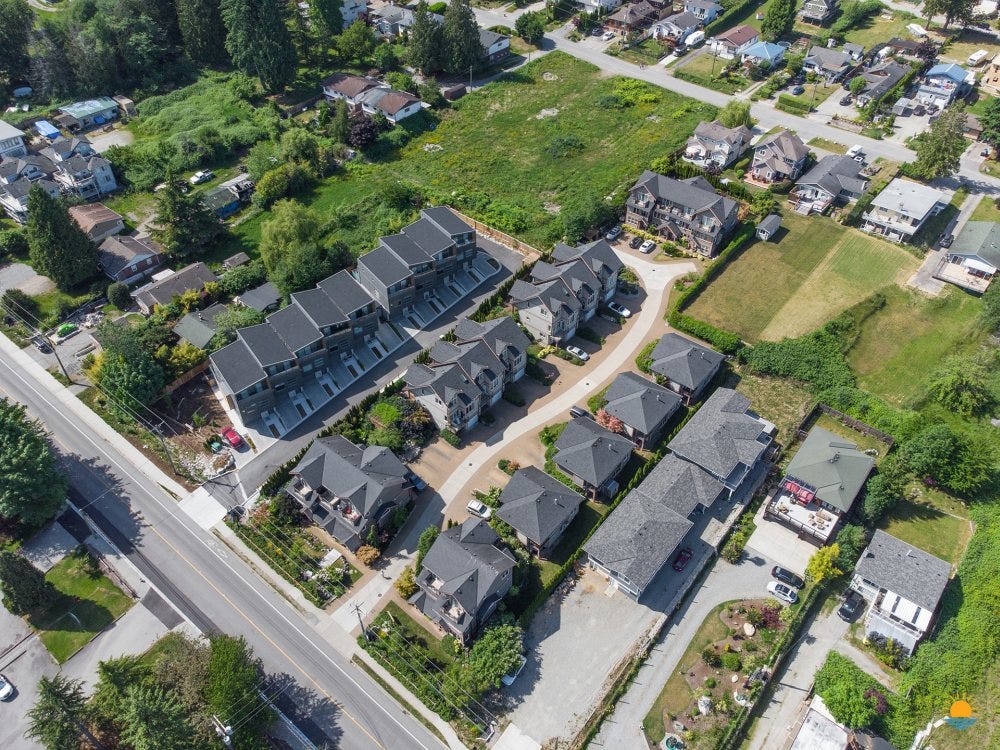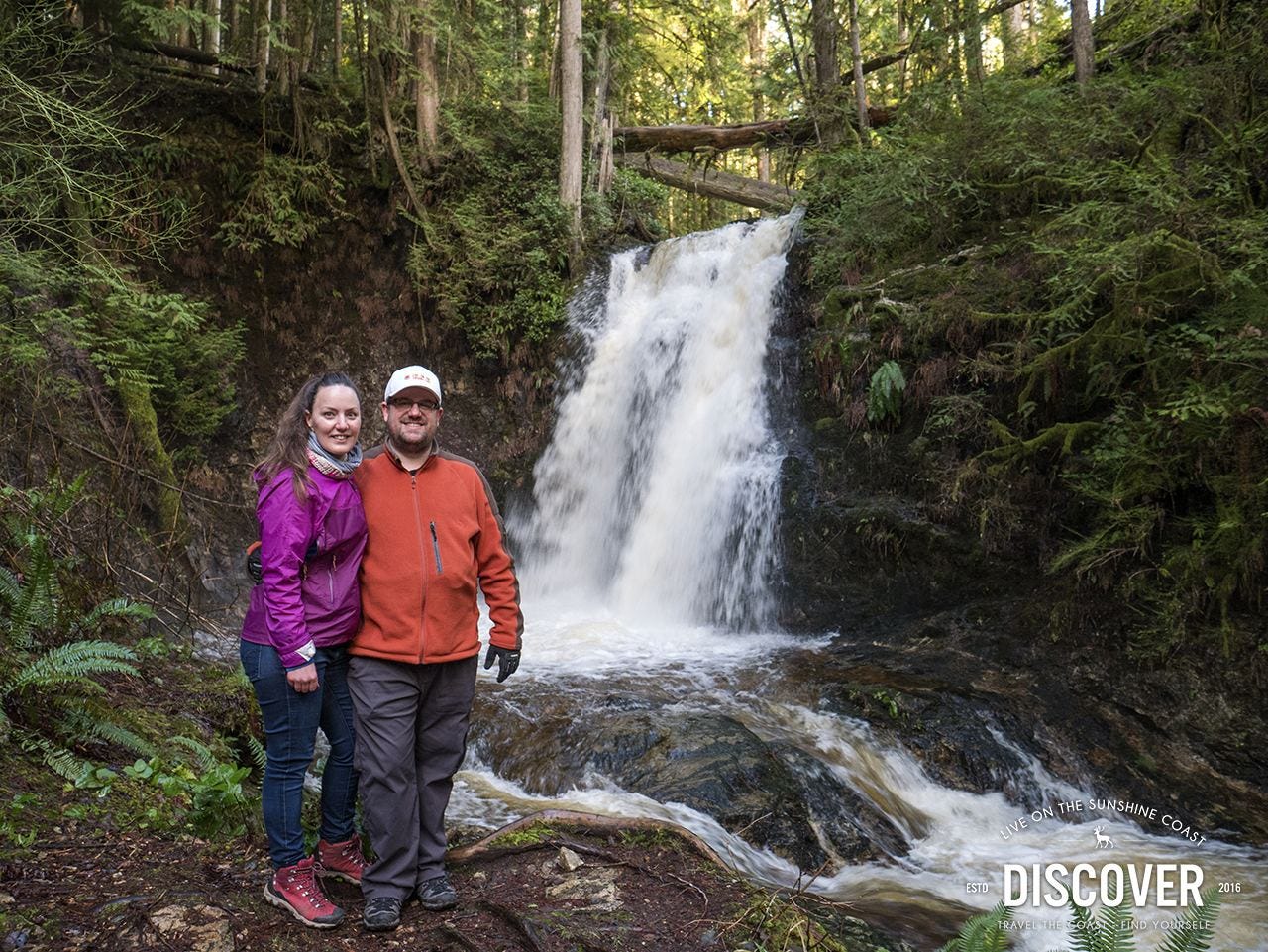Pros and cons of buying a townhouse in BC
Is it a mistake to buy a townhouse instead of a single family home?
This post was written using a transcript from the above video. It’s been edited for clarity.
PAUL: Your dream to own a big house comes with a big price tag, especially on BC’s Sunshine Coast. Is a townhouse a viable option? Or are there too many compromises?
PAUL: Compared to Vancouver, the relative affordability of buying a house on the Sunshine Coast is a big draw for people that want to move to the region. But house hunters from Port Mellon to Egmont soon find themselves faced with two challenges:
One, that property prices have appreciated a lot in a short period of time.
And two, there aren’t a lot of single family homes to pick from on the Sunshine Coast.
Condos vs. Townhouses vs. Houses
VAL: Because of their lower price point and smaller size, apartment-style condos are often seen as an entry point for first-time buyers, but a lot of people really want a single family home.
PAUL: A single family home is the Gold Standard of residential real estate and an apartment-style condo is seen as first step towards that goal. But in between condos and single family homes are townhouses. They’re typically part of a strata, but share some similarities with detached homes.
VAL: If you're frustrated by prices for single family homes, a townhouse may just be a viable option.
PAUL: We're going to talk about townhouses as they relate to us here on the Sunshine Coast. But a lot of what we’ll talk about also applies to larger Canadian markets. Much of this advice would apply in Edmonton or Toronto or the Maritimes.
PRO: Value for your money
PAUL: A major benefit of buying a townhouse on the Sunshine Coast is bang for your buck. If you're ready to spend $600,000 dollars, you'll probably be able to find a pretty decent move-in ready townhouse. But if you spend that same $600,000 on a single family home, it's likely going to be a fixer upper.
VAL: A townhouse could be a great entry point to get into the Sunshine Coast market. If a single family home is out of reach, maybe a townhouse is a better fit for your budget.
PRO: Less exterior maintenance
VAL: Another pro about owning a townhome is that there's less exterior maintenance. Usually the strata has a maintenance person or a gardener which means you won't have to cut your grass or shovel your walks.
PAUL: When we owned a house, exterior maintenance was a big responsibility. Upkeep fell on us. We cut grass, cleaned gutters, and being in Alberta, we shovelled sidewalks in the winter. But here in a townhouse, we don't do any of that. The strata has somebody that cuts the grass a couple times each month. Trees get pruned, gardens get weeded. This means that we can enjoy the exterior of the complex without any of the responsibility.
PRO: Outdoor space
VAL: Another pro with a townhouse is that you probably don't have to give up a backyard or an outdoor space. A lot of townhome units have their own specific little backyard, and often the strata has additional shared outdoor spaces as well.
PAUL: When we lived in a city, owning a house with a yard was really important to us. Even though cities have parks and other outdoor amenities, they’re not always easily accessible. So while we don’t have a huge backyard, our townhouse does give us some space to have a barbecue and to have a few people over. Specific to the Sunshine Coast, we are so close to the outdoors, we don't really feel like we've sacrificed by not having a big yard. The whole Sunshine Coast is our playground and we don’t need to limit ourselves to our backyard.
VAL: Exactly. We don't have to maintain a lawn or plants which means our outdoor time can be focused on going outside and playing in nature.
CON: Dealing with strata councils
PAUL: That's a pretty rosy picture of what it's like to live in a townhouse. While there are many benefits to townhouse living, there are also a few cons.
VAL: Living in a strata condo means you have to pay monthly strata/maintenance/condo fees and that you’re part of a mini-government. Your complex will be governed by a Strata Council, which is comprised of owners and then these owners make decisions on behalf of the strata. If you’re part of a strata, you should probably volunteer your time and be on council at some point. You won’t be expected to perform exterior maintenance yourself, but your input will help the council make choices like hiring contractors and deciding what needs to be done to care for the complex.
PAUL: In our experience, a good strata (or as every place outside of BC calls them, a condo board), is what's going to make or break your townhouse investment. If you're in a complex that’s well looked after and well cared for, and you can see there's a lot of pride of ownership, you shouldn't have any more to worry about than you would a single family home. I think finding a townhouse complex with an active strata council and knowledgeable management to be the biggest challenge in buying in this property class. You want to buy into a strata that’s planning for the future of the entire complex and not just on a few individual units. Planning for the future means collecting enough money for future maintenance and repairs and not just keeping monthly strata fees artificially low.
CON: Following strata bylaws
PAUL: Stratas all have their own set of bylaws and these bylaws govern how owners and occupants are expected to use the property. That might mean something like rental or pet restrictions or rules against smoking in common areas or saying that owners can't have a hot tub in their backyard. This is why you want to ask for a copy of the strata’s bylaws BEFORE you buy so you know what you're getting into. When you're dealing with a Realtor or a builder, asking to see the strata bylaws is a common thing and isn’t a weird request. The bylaws are something that should be readily available for you to read through so that you know what is and isn't allowed before you commit to buying.
VAL: Another common bylaw that I think is worth mentioning is that some complexes may have age restriction. For example, a complex might be limited to owners that are 55-years-old or older. While a townhouse might mean you’re less responsible for exterior maintenance, it also means there's less autonomy. For example, you can’t decide to paint your door red without the permission from the strata.
CON: Neighbours are nearby
PAUL: Another adjustment you’ll need to make when living in a townhouse compared to a detached home is that you're going to be in much closer proximity to your neighbours. Depending on the complex, you're probably going to share at least one wall with a neighbour, if not two. And while that's perfectly fine, it’s different than living in a house where all four walls are yours to do with it as you please.
VAL: When buying a single family home, you want to research the neighbourhood and the same is true for a townhouse complex. You want to research that strata, the neighbours, and what type of little community you're moving into.
CON: Monthly strata/condo fees
VAL: The last con we're going to talk about is monthly strata/maintenance/condo fees. Condo fees subtract from your buying power when qualifying for a mortgage. When you qualify for a mortgage, your lender will calculate how much debt your income is able to service and then they’ll calculate the additional expenses of owning a specific home. One of the expenses of owning a home is the mortgage, and along with that mortgage, lenders need to know what other home-related reoccurring expenses you will be responsible for. One of the additional costs lenders take into consideration are monthly condo fees.
PAUL: Does that mean that when you apply for a mortgage, lenders see condo fees as an extra payment? They see it the same as if you had an extra car payment or something like that?
VAL: That’s right. You've got to be able to cover not only the mortgage amount, but also that extra strata/condo fee amount.
PAUL: So an additional dollar spent on condo fees means, in theory, that I have a dollar less that I can spend on a mortgage?
VAL: Yes. Talk to your mortgage broker when you're pre-qualifying and see how strata/condo fees will impact what you can afford.
CON: Reserve fund expenses
VAL: Monthly strata/condo/maintenance fees cover the operation, maintenance, and the regular day-to-day expenses for the strata to exist, but a portion of those fees also cover the contingency reserve fund. This is money that the strata council is putting aside for future repairs and maintenance (EX – the roof of the complex needing to be replaced in 15 years). You want to be sure that the monthly fees are high enough to ensure there’s sufficient money set aside for these items.
VAL: If there's not enough set aside in the reserve fund, when the roof does eventually need to be repaired, there’ll be a cash-call or a special assessment. A special assessment is a one-time expense that owners need to cover, sometimes on short notice. Again, using the example of having a roof replaced, a special assessment could see owners needing to pay thousands of dollars up front to cover repair.
PAUL: Special assessments can be a real heartbreaker. It’s fairly uncommon to get one single special assessment. Usually there’s a series of special assessments because a strata typically won't ignore one part of the complex while maintaining everything else. Usually they slough off everything and then you’re paying a special assessment for the roof and another to redo the parking lot and another to replace all the windows.
VAL: Ideally, you’ll buy into a well run condo/strata that collects the right amount of fees and puts enough aside and so that the complex can be properly maintained and looked after. If this isn’t happening, don’t be surprised if you get a big bill for a special assessment.
This post was written using a transcript from the above video. It’s been edited for clarity.
Connect with Val & Paul
We're Val and Paul and we're a married couple who live on BC's Sunshine Coast! We moved from Alberta to Gibsons in 2014 and love our life on Canada's West Coast! Subscribe to our YouTube channel and email newsletter and you'll learn what it's like to live in the most beautiful place in Canada.













